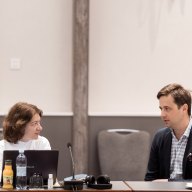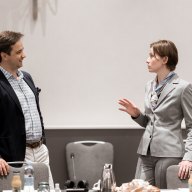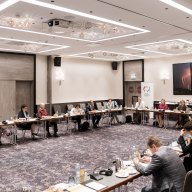6th Germany Breakfast Debate in Kyiv: Strategies for a Sustainable German-Ukrainian Partnership

Strategies for the further development of the German-Ukrainian partnership were the focus of the sixth Ukraine Breakfast Debate on 25 May 2021, which was held as a hybrid event. The guests present on site in Kyiv discussed with the Special Representative for Ukraine at the German Federal Foreign Office, Jean P. Froehly, who joined the event online. The focus was on the potential for cooperation in the fields of energy, Ukraine’s reform process and the deepening of relations with the EU and NATO.
The discussion was opened by Anka Feldhusen, the German Ambassador in Kyiv and patron of the event series. She took the visit of a delegation led by Robert Habeck, co-chair of the Bündnis 90/ Die Grünen, to Kyiv as an opportunity to briefly discuss the main topics of the meetings with Ukrainian politicians and experts and to emphasise where she sees the greatest potential for expanding bilateral relations.
Topics for a strategic dialogue
The majority of the event was devoted to the discussion of four priority topics for the future strategic dialogue between Germany and Ukraine. First, the German-Ukrainian energy partnership should be mentioned. The topic must be strategically embedded in a larger debate on energy security in the entire region and the European Union. One important aspect is the gas transit through Ukraine. Several Ukrainian experts pointed out that it was not only an important economic factor, but also had geopolitical implications. The question was what guarantees Ukraine could expect once the Nord Stream 2 pipeline will be completed. Against this background, Ukrainian participants emphasised the need for further steps towards membership in NATO and the EU.
The second field of cooperation addressed was the Ukrainian reform process, especially in the areas of justice, the fight against corruption and security sector reform. Thirdly, Ukraine’s ambitions to move closer to the European Union should be mentioned. Germany’s support for Ukraine’s Euro-Atlantic integration efforts is very important, the Ukrainian experts noted. Fourthly, economic cooperation was discussed. German companies are not yet exhausting the opportunities for investment in Ukraine, which is also linked to the aspect of a lack of legal certainty.
Common commemorative culture and the future of the Eastern Partnership
Other topics that moved the audience were the modernisation of the culture of remembrance, in particular the demand for better historical information about and separate commemoration of the victims of the German occupation of Ukraine during the Second World War. Several questions to the speaker from Germany concerned the future shape of the Eastern Partnership and the special role of Ukraine in the associated trio of countries with the Republic of Moldova and Georgia. The prospects for conflict resolution in Eastern Ukraine were also discussed.
The diversity of the topics addressed and the emotionality with which the debate on individual points was conducted show how important Germany is for Ukraine and with which hopes the view is directed towards the partner country. And, of course, also how relevant the discussion format and the regular bilateral dialogue are.
The Germany Breakfast Debates are part of the project “German-Ukrainian Researchers Network” (GURN 2). The aim of the project is to strengthen cooperation between German and Ukrainian think tanks as well as expertise in the field of policy analysis and to promote bilateral dialogue and knowledge transfer. GURN 2 is implemented in close cooperation with the Ilko Kucheriv Democratic Initiatives Foundation (DIF, Kyiv), think twice UA (Kyiv) and the New Europe Center (NEC, Kyiv). It is kindly supported by the German Federal Foreign Office.











